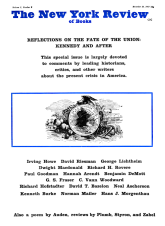The circumstances of this death were as cold and cruel, as capricious and senseless as the world we live in. We have barely awakened from the nightmare and have only begun to absorb the tragedy. It is too early to expect of ourselves a sane estimation of the extent of the disaster.
Only a little more than a year ago, in the confrontation over Cuba, Kennedy and Khrushchev walked together toward the abyss and recoiled from what they saw. Out of this there came a curious kind of mutual comprehension that had great potential value to the world. Now this, as well as a great deal more, may have been lost. It was one of Kennedy’s merits that a success which a lesser man might have exploited in jingo fashion, appeared to him to be a new occasion to explore avenues toward peace, to plan a careful search for limited agreements that would contain and confine the cold war. Hence Khrushchev’s retreat over the missiles was followed not by a rise in tension but by the test ban treaty. Amid the clamor of infantile voices calling for reckless self-assertion and total victory, Kennedy kept his eyes upon the essential truth that nuclear war is a graver threat to the world than the might of the Soviets.
Kennedy relished the possession and exercise of power, and his life seems to have been planned to train and steel him for it. His vindication, if he needs any, before a nation that profoundly suspects all authority, was that he knew so well the limitations of power and understood so well the terms on which it can be justified. In this respect, he belongs not so much to a particular political persuasion as to those men in all times for whom politics has been a distinguished and demanding craft, who see the necessity and reckon the costs of power.
The popular code for assessing powerful men is in its own way almost as ruthless as power itself. Leaders, for all the personal details about them lavished on us by the mass media, are persistently depersonalized by the public mind; inevitably they become receptacles for our grievances and demands, our impatience and irritation. Inevitably, because no one who has not sat in the seat of power, or at least at its elbow, can easily conceive of the considerations that enter into its decisions or understand the complex machinery with which it must work. There is always a reciprocal disposition on the part of the powerful and the public to regard each other as being in some degree instrumentalities rather than human realities. For this reason the death of a man who has used power with any such show of discretion and benevolence as Kennedy’s, has the effect of an abrupt awakening. Both the actual isolation of the Presidency and the false glamor shed over the White House by the press and television suddenly disappear, and we are confronted anew with a real identity and a personal fate.
I was in England when the news of the murder came, and I was impressed by the desperate immediacy this event had for people there—by the discovery that the British had in effect adopted Kennedy as their own statesman, and by the realization of how much he had done in Europe to abate or dispel the mindless anti-Americanism of the past fifteen years. I was surprised too at the all but uncontrollable emotions of one American who had never imagined that his general approval of the Kennedy regime was founded on any large reserve of warmth. Is there some principle of nature which requires that we never know the quality of what we have had until it is gone?
This Issue
December 26, 1963



